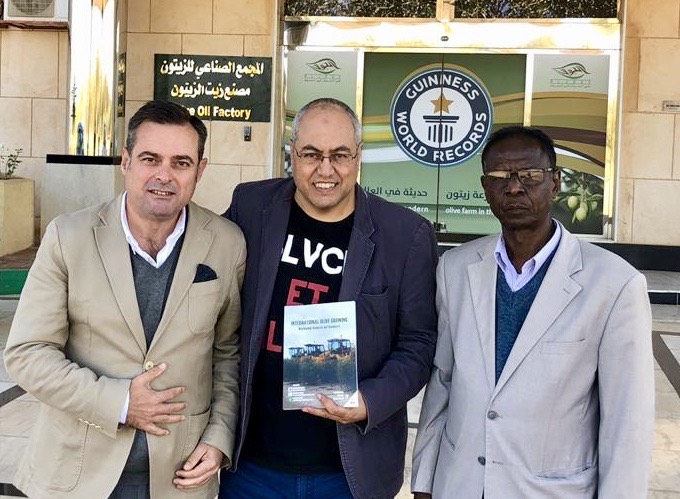On Sunday, November 18, the English version of the manual, International Olive Growing, was presented at the Al Jouf farm, the largest modern olive grove on the planet under one boundary. This recognition has been confirmed by the Guinness Book of Records. The farm is located in the north of Saudi Arabia.
The largest modern olive farm on the planet under one boundary has a total size of 60,000 hectares, of which 7,336 hectares are intensive and super-intensive olive groves (although it is still being increased at the rate of 500 hectares per year). The rest of the land still needs to be cultivated. However, at the same time there are olive trees, alfalfa, corn, fodder, date palms, fruit trees of all kinds, various vegetables and vegetables coexisting with olive trees in other adjoining farms. The company that manages the farm is Al Jouf Agricultural Development, which is composed entirely of Saudi capital and was created in the decade of the 90s.
Regarding the olive oil division, even when these 7,335 hectares are planted, not everything is producing to 100% capacity, though it obtains 20 million kg of fruit in campaigns. This amounts to about 4 million kg of oil that is used completely for local consumption and is in a packaged form. The company has 5 self-propelled mechanical harvesters and two mills, one with 3 production lines, while the other has two. Also, there is an entamadora that processes 1% of the olives obtained, with fruits orientated for this purpose from the harvesters. Similarly, about 1,200 people reside in the perimeter of the complex and are permanently employed in the group. Regarding the type of olive grove, approximately 50 percent is intensive and is of local varieties. Picual is one variety among others. On the other hand, the remaining high density olive grove is composed exclusively of arbequina, koroneiki and arbosana varieties.
The book that has the largest range of analytical information on olive growing ever published, was edited by the Caja Rural de Jaén Foundation and created through the more than brilliant initiative of Caja Rural de Jaén and Diputación Provincial de Jaén, as a way to lead the knowledge and exposure of international olive growing, which is an undeniable source of craved consumption, from the province that plays the leading role in this international sector, Jaén. In this case, it was presented at the request of Al Jouf’s management in order to show the knowledge to the more than 200 people attending the event. The creators of the book also collaborated with the International Olive Council (IOC), collecting data from FAO, as well as more than 400 field researchers distributed in 62 countries. The invitation to the presentation was ratified by the Saudi Arabian Embassy in Madrid. To this day, this manual has been presented in 3 of the 4 contents, and can be obtained in Spanish, French and English. Further work is being done on the updated version in Arabic and Italian, thus covering each and every one of the members of the great family that makes up international olive growing, speaking the same language they speak.
According to Juan Vilar, the coauthor of the work, «it is vital to have such complete information in the broadest geographical senses to be able to develop yourself professionally in an increasingly globalized sector. The work presented consists precisely of this, and the fact that all the work has been done in an olive grove, which is a world reference for its size and idiosyncrasy, makes it an even more unbelievable experience «
Adel Majed, Director of the monitoring and monitoring area of Al Jouf states, «it is a source of pride and honor to have been able to support the outreach of knowledge, experience, and content of the aforementioned work. This has helped them to more precisely understand the current state of affairs that exists in international olive growing, entailing an essential support in the daily management of the company, as well as in the design, layout and application of future strategies».
Olive Farm’s video
Photo: Juan Vilar, coauthor of the work, Yassen Hamdi, director of the mill, and Adel Majed Director of the monitoring and tracking area

